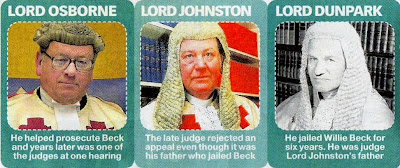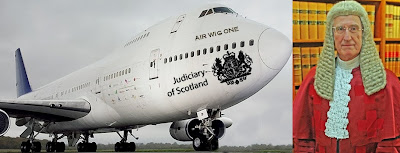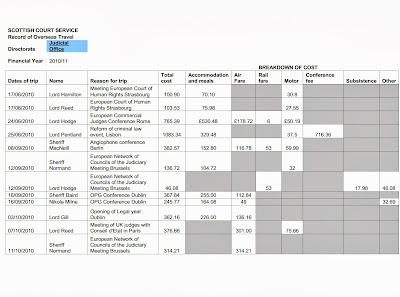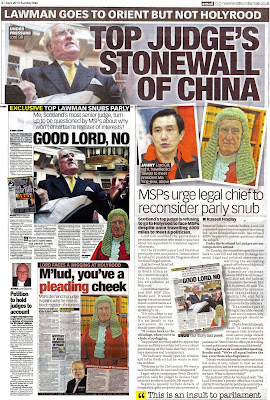 Judges with links to original trial failed to declare their interests. THE complicated mixture of Judicial oaths & rules which govern the current requirements of Scotland’s judges to declare any interests in court has this week been proved to be a catastrophic failure by evidence which depicts cosy clubs, prosecutors turned judges, & undisclosed family relationships between members of the judiciary in Scotland’s top courts.
Judges with links to original trial failed to declare their interests. THE complicated mixture of Judicial oaths & rules which govern the current requirements of Scotland’s judges to declare any interests in court has this week been proved to be a catastrophic failure by evidence which depicts cosy clubs, prosecutors turned judges, & undisclosed family relationships between members of the judiciary in Scotland’s top courts.
Legal insiders say the evidence provided to MSPs on the Scottish Parliament’s Petitions Committee may well be the tip of the iceberg with regard to judges failing to properly declare their interests when faced with cases in which their personal and professional interests collide.
Glasgow man William Beck, who many inside & outside the justice system are satisfied was wrongfully convicted for an armed robbery over thirty one years ago, made the submission to the Scottish Parliament Petitions Committee concerning the failure of judges to recuse themselves in his appeal against his conviction.
The evidence provided by Mr William Beck in response to Petition PE1458: Register of Interests for members of Scotland's judiciary reveals how one judge, Lord Johnston, failed to declare any interest or recuse himself from an appeal by Mr Beck against a wrongful conviction & sentence handed down by Lord Dunpark who was Lord Johnston’s father.
Mr Beck’s submission to MSPs also reveals that years later, Lord Osborne, who sat with two other judges and rejected another appeal by Mr Beck against his wrongful conviction, failed to disclose that he was the prosecutor in the original trial of Mr Beck.
When Lord Osborne was recently asked by journalists why he did not recuse himself or reveal his role in the original case against Mr Beck, Lord Osborne, now retired, claimed he had “no recollection”. The retired judge went on to admit he should have recused himself.
Mr Beck has been fighting to clear his name ever since his wrongful conviction, and the terns of his submission and evidence provided appear to make it clear to all that even the most senior judges, prosecutors and others in the legal system have been long aware of conflicting interests of members of the judiciary which have not been properly declared.
The evidence provided by Mr Beck, which identifies multiple failures by judges & prosecutors who became judges to declare their interests in court, is in stark contrast to arguments presented by the current Lord President Lord Brian Gill who has previously claimed the current judicial recusal system works well in brief, albeit antagonistic letters to MSPs on the Scottish Parliament’s Petitions Committee in response to Petition PE1458: Register of Interests for members of Scotland's judiciary
William Beck’s submission to the Scottish Parliament reads as follows :
I would like the following to be presented to the Public petitions Committee hearing the petition PE1458 : At an appeal hearing in 2006: appeal hearing in 2006 Two judges ought to have recused themselves or at the very least declared an interest in my case.
Lord Johnston was the son of my trial judge which he did not declare. Lord Osborne had acted as an Advocate Depute in my appeal on 7th October 1982 and did not declare this.
Both ought to have known from the court papers, namely the Charge to the jury and Interlocutor of 7th October 1982 which would have been before the court. The charge discloses the name of the trial judge and in this instance was Lord Dunpark the Father of Lord Johnston.
I only found out that Lord Dunpark was the Father of Lord Johnston when I read the obituary for Lord Johnston when he died. Had I known of any of these connections I would have asked them both to recuse themselves. The interlocutor is attached above and I can produce the charge to jury should it be required.
Lord Osborne is quoted as saying had he known about this link he would have recused himself. I cannot accept this position as it clearly states in the 2006 appeal linked above my appeal was rejected on 7th October 1982.
The only way Lord Osborne or any of the other two judges that heard this appeal would have known this is indeed by viewing the interlocutor with Lord Osborne’s name attached. (See Interlocutor of 7th October 1982)
Lord Johnston made a comment (Which will be recorded) that Lord Dunpark certainly had a way with his quirky comments knowing full well he was referring to his Father.
It is my belief that the reactions from the court after this comment that everyone(Apart from me) in that court that day knew of these connections including the Advocate Depute.
Like I have said had I known of these connections I would have asked these judges to recuse themselves but the judges also had a duty enshrined within the Bangalore Principles to recuse themselves which they also ought to have done.
The fact they did not recuse themselves leaves me feeling I can never get a fair hearing in Scotland.
To add insult to injury I tried to raise this matter at a Nobile Officium Appeal for the court presided over by the Lord President to ignore it completely.
How can they ignore it completely I hear everyone ask. Simply because they can.
My defence team produced the interlocutor from 1982 showing Lord Osborne had prosecuted me yet this is not reflected in the opinion which states I did not raise any issue apart from being refused Legal Aid in 1982. This should be recorded and I would urge the committee to ask the High Court to answer this allegation and provide the tape recording and transcript of the Nobile Officium Appeal.
So not only do I have two judges sitting on my appeal who ought to have recused themselves but when I tried to raise this issue it was ignored by our courts at its highest level.
My MSP Bill Kidd raised this issue with the Lord President (And many others within the Judiciary) asking him the meaning of the Latin Phrase “Nemo Iudex In Causa Sua as well as raising it with Kenny MacAskill to no avail, and now after a Sunday Mail expose Lord Osborne is saying he would have recused himself if he had known.
I tried raising this as a devolution issue (At Nobile Officium) referring to Hoekstra and Pinochet only for the court to tell the Crown not to appear in a deliberate attempt to stop me raising a devolution issue.
This is clearly pointed out by the court of appeal at Nobile Officium paragraph 1 where the court say this: The Lord Advocate is not, so far, a party to these proceedings and has not been invited to address the court on the issue of competency or on any other issue. This makes the position of the court clear: They did Not Invite The Crown To Appear.
I would suggest this was a deliberate attempt to deny me not only the act of raising a devolution issue but also a fair hearing enshrined within article 6 of the European Convention of Human Rights.
I should point out that every case in Scotland are indeed indicted at the instance of Her Majesty’s Advocate and this is a duty that applies throughout the history of any case including appeals. Never in the history of Scots Law have Crown Failed to appear at an appeal. This proves that not only did two judges sit on my appeal when they ought not to have done so but there have been a concerted attempt from the Judiciary to cover this up since.
In their attempts to stop me raising a devolution issue they have created a bigger one. This also shows how cosy the relationship is Between our Courts and Crown Office.
I would welcome the opportunity to give evidence to the committee at any evidence gathering session, unlike Lord Gill.
The Sunday Mail newspaper has also reported on Mr Beck’s case :

They shouldn’t have been anywhere near my appeal
ROUGH JUSTICE FIGHT JUDGES’ LINKS QUESTIONED
By Russell Findlay Sunday Mail 09/06/2013
A robber fighting a 31year battle to clear his name yesterday claimed two judges who blocked a crucial appeal had links to his original trial.
Willie Beck, 52, discovered that Lord Osborne presided over his appeal hearing despite helping prosecute him in 1982.
And Lord Johnston sat on the 2006 hearing even though his father Lord Dunpark was the original trial judge who had jailed Beck for six years.
The dad-of-two, of Dennistoun, Glasgow, said: “At the hearing in 2006, I had no idea that two of the three judges had strong personal connections to my original trial.
“National Archives records revealed Lord Osborne, then called Kenneth Osborne, was the advocate depute who prosecuted me in 1982.
“There are supposedly rules in place to ensure judges don’t get involved in cases where they have kind of conflict. It’s clear to me that he should have declared his connection and stepped aside.”
Beck was sentenced to six years in 1982 for a robbery in Livingston, West Lothian.
In 2006, the three judges including the late Lord Dawson rejected Beck’s appeal against an earlier decision not to allow a time extension.
Lord Johnston died in 2008 but Lord Osborne, now retired, said: “You’ll appreciate that an advocate depute prosecutes a great many cases and I have no recollection of this one.
“If it had been drawn to my attention that I had an involvement as a prosecutor I would have recused myself but I had no recollection of it.”
Two months ago, Beck lost an appeal against his conviction at the Court of Criminal Appeal in Edinburgh. He now hopes to appeal to the Supreme Court in London.
 Jet set judges prefer life in the air to sitting in Scots courts. IF those of you stuck in Scotland’s “Victorian” courts for years have ever wondered what judges do in their spare time when they are not sitting on the bench or raising an eyebrow at the mutterings of counsel, one of the answers lies above the clouds, in the numbers of air miles Scottish judges clock up each year on a variety of
Jet set judges prefer life in the air to sitting in Scots courts. IF those of you stuck in Scotland’s “Victorian” courts for years have ever wondered what judges do in their spare time when they are not sitting on the bench or raising an eyebrow at the mutterings of counsel, one of the answers lies above the clouds, in the numbers of air miles Scottish judges clock up each year on a variety of  Scottish Judicial Airways : Overseas trips 2010-2013 taken by Scottish judges (Click image to view details). And how the media reported it : JET-SETTING LAWMEN NOTCH UP £83K BILL
Scottish Judicial Airways : Overseas trips 2010-2013 taken by Scottish judges (Click image to view details). And how the media reported it : JET-SETTING LAWMEN NOTCH UP £83K BILL Further reports on the travels of Scottish judges in the media have also revealed the Lord President himself, Lord Gill, enjoys regular excursions to the far east including China and Taiwan.
Further reports on the travels of Scottish judges in the media have also revealed the Lord President himself, Lord Gill, enjoys regular excursions to the far east including China and Taiwan.
